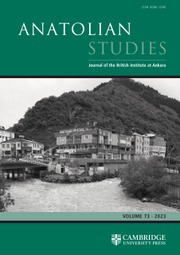No CrossRef data available.
Article contents
Crimean Tatars in explorative and travel writing: 1782–1802
Published online by Cambridge University Press: 17 July 2017
Abstract
This article discusses the portrayal of Crimea, particularly Crimean Tatars and their culture, through the writings of nine men and women who travelled in the region in the late 18th century. These writers travelled in different capacities and represent a diversity of viewpoints; they include figures of the Russian academic and political establishment and western European travellers, with or without Russian affiliations. The article sets their writings in the context of the imperial Russian rhetoric of conquest associated with the annexation of Crimea in 1783 and Catherine II's tour of the area four years later. This rhetoric remains relevant today through the marked persistence of certain historic tropes in contemporary Russian attitudes towards Crimea. The article also discusses the writers’ responses to Crimea in the light of broader Enlightenment tropes in travel writing and ethnographic observation. It examines the extent to which the travellers’ accounts of Crimea were shaped by notions of ancient Greek heritage, Scythians and ‘Tartar hordes’, attitudes towards the Ottoman Empire (Crimea had previously been an Ottoman protectorate) and Islam, and 18th-century orientalism.
Özet
Bu makale, 18. yüzyılın sonlarında bölgede seyahat eden dokuz erkek ve kadın gezginin yazdıkları aracılığıyla Kırım’ın, özellikle Kırım Tatarlarının ve onların kültürlerinin tasvirini tartışmaktadır. Bu yazarlar farklı amaçlarla seyahat ediyor ve çeşitli bakış açılarını temsil ediyorlardı; yazılarında Rus akademik ve siyasi kuruluşlarına ait şahıslara ve Rusya ile ilişkileri olsun veya olmasın, batı Avrupalı gezginlere yer veriyorlardı. Makalede, bu yazılar, Rus imparatorluğunun 1783’te Kırım’ın ilhakıyla bağlantılı olan fetih söylemi ve II. Catherine’in dört yıl sonra bölgede yaptığı tur kapsamında düzenlenmiştir. Bu söylem, günümüzde Kırım’a yönelik Rus tutumunun belirgin ısrarları ile bugün hala geçerliliğini korumaktadır. Makalede ayrıca yazarların Kırım ile ilgili düşünceleri, gezi yazısı ve etnografik gözlemlerdeki daha geniş bilgiler ışığında tartışılmaktadır. Kırım’la ilgili gezi notlarının; eski Yunan mirası, İskitler ve ‘Tartar horda’larına (göçebe yağmacı topluluk) ait düşünceler ile, Osmanlı İmparatorluğu’na (Kırım daha önce Osmanlı himayesinde idi) ve İslam’a yönelik tutumlar ve 18. yüzyıl oryantalizmi tarafından ne derece şekillendiği incelenmektedir.
- Type
- Articles
- Information
- Copyright
- Copyright © The British Institute at Ankara 2017




